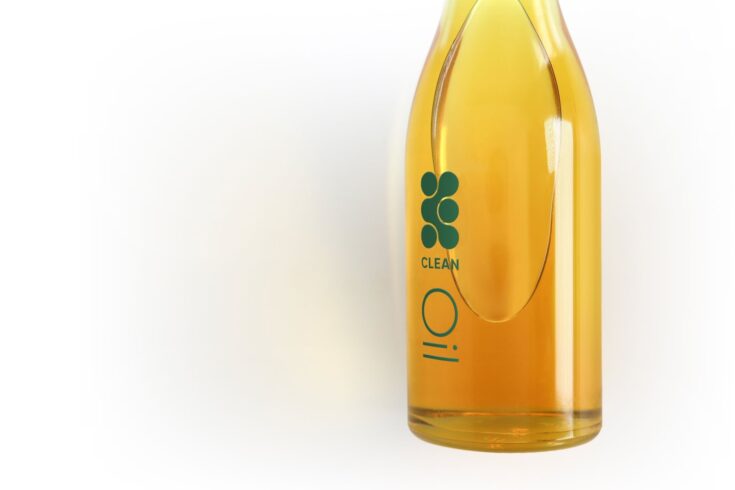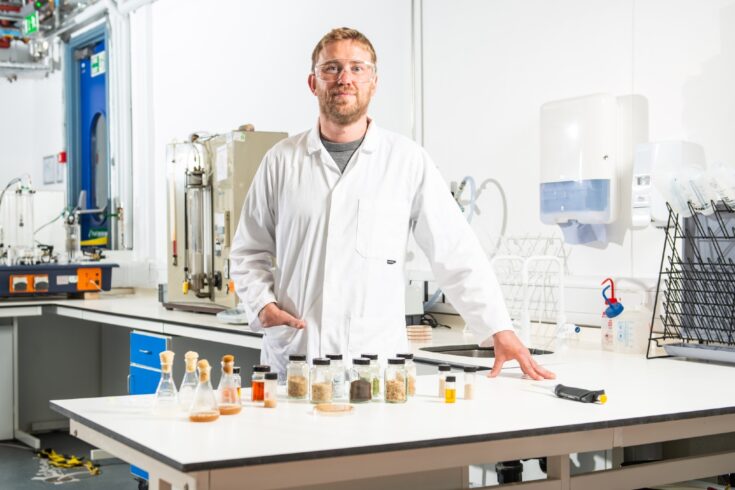The process uses a specific strain of yeast, Metschnikowia pulcherrima (Mp), found on the surface of grapes used in winemaking. Mp can metabolise a wide range of carbon sources, producing a yeast-based alternative to edible oils, like soybean or palm. This alternative has a vastly reduced environmental impact and could provide a crucial sustainable substitute.
Addressing growing public demand
To address the growing public demand for sustainable alternatives to traditional oils and fats, such as palm and soy, and to scale up the technology to a commercially viable level, Professor Chuck co-founded Clean Food Group.
The team used directed evolution, a process that mimics natural selection, to develop a commercial strain of Mp. This increased its growth rate three-fold, reaching the threshold for commercial viability, and building a viable process around using food waste as the carbon source for the yeast, promoting a circular food system.
Now, with Professor Chuck as its Technical Lead, Clean Food Group is collaborating with industry partners to bring novel products to market.
Early research
The scientific groundwork needed to develop this technology was enabled by several UK Research and Innovation (UKRI) grants.
Early Biotechnology and Biological Sciences Research Council (BBSRC) and Engineering and Physical Sciences Research Council (EPSRC) funding came via the Plants to Products Network in Industrial Biotechnology and Bioenergy.
The funding supported crucial proof of concept research on Mp’s ability to produce an alternative oil. This project, in collaboration with Croda, tested whether Mp could produce lipids from an agricultural residue feedstock.
In 2016, Professor Chuck was awarded a £3.19 million Industrial Biotechnology Catalyst (IBCAT) grant, co-funded by EPSRC, BBSRC and Innovate UK. The project was a collaboration between the University of York and industry partners AB Agri, Croda and C-TECH.
The IBCAT grant was to develop a pilot-scale biorefinery to see if marketable compounds could be produced at a suitable scale. The project was a great success, proving that the technology could produce the palm oil substitute cost-effectively.
An EPSRC Impact Acceleration Account award also supported pilot work, enabling the team to demonstrate the technology at pilot scale for the first time.
The environmental cost of palm oil
Palm oil is versatile, low-cost, and the most widely consumed vegetable oil in the world. Once refined, it’s colourless, odourless, and tasteless and easily incorporated into food, beauty, and hygiene products. It is a popular choice amongst major brands due to its many useful properties, including its ability to extend shelf life.
The UK is 100% dependent on palm oil imports which feature in over 50% of products found in a supermarket. Outside the UK, it’s also used for animal feed and biofuel.
However, it’s also known widely for its environmental damage as it:
- drives deforestation
- destroys the habitat of endangered species
- releases carbon and greenhouse gases into the environment
- dramatically reduces biodiversity
- pollutes waterways
Searching for a solution
The search for a solution to palm oil has been progressing for decades. Suggestions include reducing the use of palm oil, switching to other oils, or producing sustainable alternatives.
Reducing edible oil production without a range of sustainable alternatives would be a great risk to food security and would likely affect low-income countries the most. To feed our growing population, we need to increase food and edible oil production.
Switching to other oils alternatives would still require land to grow the crops and would similarly produce heavy greenhouse gas emissions.
A reduction in edible oil production is only viable with sustainable, price-competitive alternatives with similar properties and benefits.
The Clean Food Group’s solution
Due to the unique nature of Mp, the company uses food-safe waste as a feedstock and uses renewable energy to fuel the process, which involves growing the yeast in industrial fermenters.
Global food demand is projected to increase between 70% and 110% by 2050. That will pose significant challenges for land use. Today, most fertile land is already cultivated. Increasing demand for land means that it is not possible to simply grow more food to meet the predicted global food demand.
A hectare of palm (or seven hectares of soy) can produce approximately 3.7 tonnes of oil a year. To produce a similar amount, Clean Food Group would need only a 1,500-litre fermentation vessel, which takes up only 1m2 of space. It would produce less than 5% of the greenhouse gas of soy or palm.
Fermentation vessels also do not have palm oil’s productivity disadvantages, such as the declining productivity of plantations over time or the need to leave land fallow to recover.

Credit: Clean Food Group
Circular economy approach
A circular economy approach is also a crucial part of Clean Food Group’s strategy, which will ensure food security for our ever-growing population while limiting the environmental impact.
By using green waste and green energy, the environmental impact of oil production can be further reduced. For example, food waste can be recycled back into the food chain to produce more products. When localised, this can eliminate damaging supply chains.
Benefits of a precision fermentation platform
The palm oil alternative is Clean Food Group’s first go-to-market product. Clean Food Group’s technology for its production platform can be used to develop an array of custom-made oils. In the future, this platform could be used to target other edible fats, like cocoa butter and nutraceuticals.
Professor Chuck says:
With precision fermentation, you’ve got more control over the organism. You’re not just growing a field of rapeseed. We can tweak and change the oils and make them more suitable for their applications. That allows us to tailor our oils and fats to the very specific functional requirements of our food and cosmetic manufacturing customers.
By targeting the more specific oil formulations higher up in the value chain rather than bulk oils like palm, Clean Food Group can compete economically. This also helps address the price volatility in the edible oils market, where costs continue to rise.
Part of this success is due to ‘informed innovation’ through industry partnerships and communication. This allows for real-time feedback on the oil market, highlighting gaps and providing expert knowledge on industry needs.
Commercialisation and partnerships
Professor Chris Chuck co-founded Clean Food Group with Alex Neves and Tom Ellen in 2022, to commercialise the research and bring the edible oil product to market.
Clean Food Group has received funding from a range of investors over the two years it has been operational. The group has raised over £7 million in equity funding from Venture Capital firms such as Agronomics, Clean Growth Fund and Seed Innovations, as well as industry investment from the Döhler group and Alianza.
Döhler Group
The Döhler group is a global producer, marketer and provider of natural ingredients for the food and beverage industry. They are collaborating with the Clean Food Group to scale up the fermentation process for commercial use, which was a major hurdle for getting the alternative oil to market.
The Döhler group successfully demonstrated the translation of the technology to their pilot plant in Germany in 2023, followed by the successful completion of a 6,000L demonstration facility in Ledbury. The facility will operate over 2024 and 2025 to demonstrate the low-cost fermentation at scale and produce batches for regulatory approval.
Alianza
In 2023, this was followed by investment and collaboration with Alianza Team, a Latin American food production and lipid-based technology company. The collaboration and joint expertise will assist in bringing a range of healthy and sustainable oils and fats to market.
Roberts Bakery
Clean Food Group has recently partnered with UK-based Roberts Bakery. The bakery will provide a consistent supply of surplus waste bread products (breadcrumbs, flour and crusts) for a cost-effective and sustainable feedstock for Mp fermentation. Roberts Bakery can then incorporate the oil alternative into its products, providing a clear example of the commercial viability of a circular food economy.
This will also take advantage of the mass amount of waste bread lost from the supply chain, which is estimated to be equal to 25 million slices of bread a day in the UK. In the UK, approximately 9.5 million tonnes of food are wasted annually, costing the economy £19 billion.
What’s next?
Clean Food Group has received additional public and private funding. Through 2024 to 2025, they will be working through the cosmetics regulatory pathway and scaling up for commercial sales of their first oil alternative.
Supporting this, BBSRC and Innovate UK awarded a £1 million Novel Low-Emission Food Production Systems: Industrial research grant. The 18-month project will involve further collaboration with the University of Bath and aims to scale up manufacturing capability.
Professor Chuck is also a co-principal investigator in the £2 million Pasture to Plate (P2P) project, which is funded by the Transforming UK Food Systems Strategic Priorities Fund. Professor Chuck is leading the University of Bath component of P2P, which is supporting research into grass and silage as another feedstock for yeast. This circular economy process will guarantee future feedstocks for greater scaling needs.
Professor Chuck says:
One of the key challenges in precision fermentation is how we quickly scale out sustainably and start competing on price and volume with traditional edible oils. To do this, we must expand our ability to use multiple feedstocks, such as food wastes, silage, grass, and even seaweed.
And we have to be able to step into existing plant machinery. To do that, you need really robust organisms that are very flexible and platforms that work in multiple locations. And that’s exactly what we’re working on at Clean Food Group. The BBSRC-Innovate UK funding is helping us establish that.
More information
Clean Food Group’s official website.
University of Bath’s impact story on developing a sustainable alternative to palm oil.

